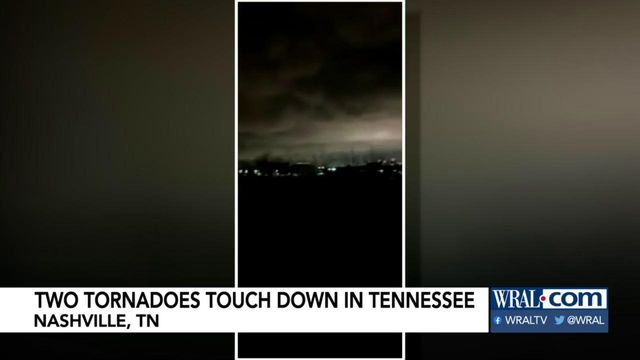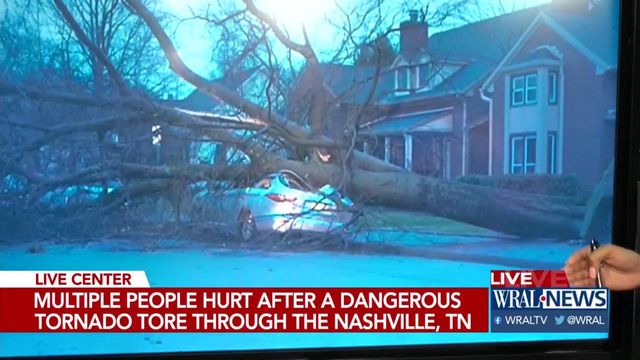Tornadoes Kill 25 in Tennessee, Shredding Buildings in Nashville Area
DOUBLE SPRINGS, Tenn. — Jean Gregory had been fast asleep when her husband yanked her to the floor and flung himself on top of her for six, seven, maybe 10 minutes, as they waited for the tornado that had descended on their small community in Putnam County, Tennessee, to finally pass.
Posted — UpdatedDOUBLE SPRINGS, Tenn. — Jean Gregory had been fast asleep when her husband yanked her to the floor and flung himself on top of her for six, seven, maybe 10 minutes, as they waited for the tornado that had descended on their small community in Putnam County, Tennessee, to finally pass.
“It just shook the house — they said it moved off the foundation,” said Gregory, 73, as she surveyed the ruins of the house she had shared for decades with her husband.
Around them, it was much worse. At least 19 people died Tuesday morning in Putnam County after a series of tornadoes cut a swath across the central part of Tennessee, killing at least 25 people in all. In Gregory’s neighborhood, a mix of trailers, houses and modest apartments, the devastation was everywhere.
A few yards away, a woman was found dead outside her trailer. The woman’s husband was found hours later, buried under rubble. On the other side of Gregory’s house, she said, the wind picked up a trailer and slammed it back down, killing a man inside.
Upended cars, massive uprooted trees and splintered remains of homes littered the streets.
State officials said Tuesday they were grappling with uncertainty, pushing to learn the full extent of the destruction as search-and-rescue crews combed through wreckage and as other workers worked to clear streets strewn with debris and electrical wires.
“It is heartbreaking,” Gov. Bill Lee said in a news conference. “We have had loss of life all across the state.” Fatalities were also reported in Davidson, Benton and Wilson counties.
In East Nashville, an area transformed after deadly tornadoes two decades ago, a man and a woman died after being struck by debris while they ran to their car from a bar that was leveled. It was a stinging reminder of the area’s long history of devastating and violent storms.
The Nashville area, with a population that has swelled to nearly 2 million people, has in many ways come to be defined by its boom. Gleaming glass buildings continue to crop up. Construction cranes dot the skyline. And on small lots in some parts of the city, developers have built tall, narrow space-maximizing houses that residents call “skinnies.”
This time, in an alarming display of raw force, the tornadoes hit old buildings as well as ones without the siding even on yet. The authorities reported that at least 48 structures in the city had either partially or completely collapsed.
“It is a massive act of nature,” John Cooper, Nashville’s mayor, said at a briefing Tuesday. He pointed out an auto-parts store that had been eviscerated. “There was no stopping that,” he told reporters.
The tornadoes cut a path through the middle of Tennessee after severe storms moved through the region. On Monday night, the National Weather Service urged people to take cover. The first report of a tornado came in at 12:40 a.m. Tuesday, the police said.
The region is familiar with outbreaks of tornadoes arriving this time of year, with deadly storms in 1933, 1998 and 2008. A decade ago, an engorged Cumberland River flooded Nashville, killing about 10 people. Now, as they did then, many said they would rely on a strain of resilience running through the community to recover and rebuild.
“It’s time to show the world, once again, that we can accomplish a whole lot when we come together as a community and lend each other a helping hand,” Cooper said.
President Donald Trump said that he would visit the Nashville area Friday, adding that he was working with state officials and that the Federal Emergency Management Agency was on the ground.
“Our hearts are full of sorrow for the lives that were lost,” Trump said, speaking at a conference for the National Association of Counties in Washington. “It’s a vicious thing, those tornadoes.”
Tennessee was one of 14 states voting on Super Tuesday, and election officials said the start of voting in Wilson and Davidson counties, which includes Nashville, had been pushed back an hour because of street closures, power outages and damage to polling locations. In some places, polls were also closed an hour later than scheduled.
Schools in Nashville and elsewhere were closed, and tens of thousands of people across the region were without power.
On a local television newscast, an anchor compared photographs of streets lined with popular restaurants, hangouts and murals with the rubble that had taken their place. The Basement East, a popular music venue next door to the Attaboy, which the couple who was killed had been leaving, was severely damaged, and the roof appeared to have blown off.
Pat Isbey, who co-owns a brewery and restaurant, lives in an East Nashville home built in 1893 that is just a few steps from bars in the popular Five Points area. “I was watching it out the window,” he said, “and the front window implodes, and I realized it was getting bad real quick.”
He tallied the damage: “I lost three out of four chimneys. Almost all of the windows are broken out, including storm windows and interior. The back porch is pulled off the house. Two trees are downed in my backyard. Both cars are damaged, one of them totaled. That’s a lot to happen in less than 40 seconds.”
The tornadoes left some of their biggest messes and heartache in North Nashville and into nearby Germantown, a neighborhood of quaint cottages. Old storefronts had been ripped apart, crumbling into piles of bricks. A second-floor kitchen in an apartment over a storefront was exposed, dusty wine bottles and a stainless steel stove visible from the street. Felled trees and snapped power poles were everywhere. Power lines sagged across streets.
The rebuilding work began early in the morning. Crews and volunteers cleared debris and handed out water. Trucks of workmen descended. The whine of chain saws reverberated all around.
Dawn Cornelius stood on a battered street in North Nashville, looking at Mt. Bethel Missionary Baptist Church, where she had spent many Sunday mornings as a child. Much of the roof had been torn off. Inside, the sanctuary was a mess.
Cornelius, 47, held a shard of the old church sign. A friend came in for a hug.
“This is scary for me,” she said. Cornelius no longer lives in North Nashville, but she returns because its streets still feel like home.
Members of her African American family had settled in North Nashville beginning in the 1950s, as white flight started. They built a community, with churches like Mt. Bethel serving as corner anchors. Many of them were ravaged now. A few years ago, as Nashville got trendy, new houses and condos went up everywhere, and a young and largely white contingent of neighbors came in.
In some cases, the homes had made it through the storms with minimal damage. But other buildings, new and old, had been torn apart. It was the old places, with the old neighbors, that she worried about. She saw it happen in 1998, she said, with the tornado that ripped up East Nashville.
“It ushered in the hipster movement there,” said Cornelius, who works with the Chamber of Commerce, referring to an outbreak of about a dozen tornadoes that swept through the middle of Tennessee and hit Nashville especially hard.
She said she worried about black families losing their toehold on the middle-class dream. “Marginalized communities are not going to be able to rebuild,” she said.
About 80 miles away in Putnam County, the authorities said the most severe destruction in the area was between the cities of Cookeville and Baxter. “The tornado came through and actually demolished and decimated everything in its path,” the county sheriff, Eddie Farris, said in a briefing.
Tim Sharp, the pastor of Boma First Church of God in Baxter, was at home in Cookeville when the tornado alarms in the town center began to wail around midnight. “We heard the alarms go off, and there was a lot of lightning,” he said. “It would light up the skies, and you could see how low the clouds were. So it was a scary experience.”
On Tuesday morning, Gregory’s granddaughter Mandye Green was wandering up and down the hilly roads while trying to find her grandmother’s house. She knew the Double Springs neighborhood well, and so it felt strange to be lost.
“This is not really recognizable,” said Green, 29. “No landmarks.”
She looked down a hill toward another community called Echo Valley, which also looked to be decimated. Green called a family member, and realized where she had taken a wrong turn. Finally, she found her grandmother’s house — or what was left of it.
Now the neighborhood was full of rescue crews and ambulances, and sheriff’s deputies from other counties going door to door, looking for the living and the dead.
Gregory knew the future would be like this for a while, full of hard work and dispiriting realities, but also with people helping. “It’s horrible,” she said. “But everybody will just come together, like they did this morning.” A few yards away, there was a concrete block foundation that served as a mere outline. The small house itself was about 25 feet away, but no longer a house — just another pile of broken wood, Babybel cheese in a mesh bag, video games in boxes, clothes hangers, a pile of maps.
Joey Yow, 32, an employee of the Discovery Channel, stood atop the pile. Yow’s brother-in-law and his brother-in-law’s wife had been tossed by the wind along with the house, but survived with cuts and scrapes. They were elsewhere, safe.
Yow and his wife were picking over their family members’ belongings. “Just putting the pieces back,” he said. His wife had an envelope, and was digging through the insulation and the wood scraps. She found a photograph of a man, and a prescription bottle, and a belt. They all went into the envelope.
Copyright 2024 New York Times News Service. All rights reserved.






